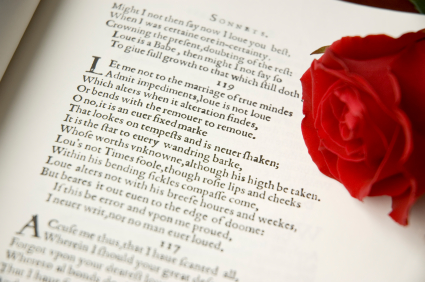In my earlier years, I spent a fair amount of time in Russia (a better version!) and had the opportunity to attend various dinners and other social gatherings. Maybe it was just the company I was keeping, but I remember being struck by the fact that, as the vodka bottle drained a bit and the meal wound down, it was not uncommon for someone to recite a poem from memory.
Often multiple someones. Often multiple poems.
It was the type of thing I had not experienced – and still do not experience – in the United States.
These days, it feels like you don’t get much credit for memorizing much of anything. Memorization has long since fallen out of favor in education circles. At least in the rhetoric. And to memorize poetry – well, it seems no one reads poetry anymore, much less memorizes it.
That’s a true shame. As I think my Russian companions understood and appreciated, rote memorization may be of little value, but memorization as a path to expand your thinking, savor key life moments, and dig more deeply into a topic is of immense value.
And poetry – well, personally I believe that to memorize and deeply know a poem is among the more sublime learning experiences there is.
So, with the hope of inspiring you to take up the challenge of memorizing a poem – or renew your commitment if you are already a converted memorizer, here are seven reasons to master a bit of verse, no matter how small:
1. It Helps You Appreciate How Much Things Change
As absorbed as each of us tends to be in our day-to-day lives, it’s easy to lose perspective on exactly how much things have changed – even over the course of the past several generations. Poems from other times often bring the forces of change into stark relief.
I clearly recall the first poem I had to memorize a poem back in high school – and yes, it mostly still survives somewhere in the depths of my hippocampus. It was a chunk of the General Prologue to Geoffrey Chaucer’s The Canterbury Tales in Middle English:
Whan that Aprill, with his shoures soote
The droghte of March hath perced to the roote
And bathed every veyne in swich licour,
Of which vertu engendred is the flour;
Whan Zephirus eek with his sweete breeth
Inspired hath in every holt and heeth
The tendre croppes, and the yonge sonne
Hath in the Ram his halfe cours yronne,
And smale foweles maken melodye,
That slepen al the nyght with open eye-
(So priketh hem Nature in hir corages);
Thanne longen folk to goon on pilgrimages
Yes, folks. This is English. An earlier version of the same stuff you and I speak today. And it was well under a 1000 years ago that people were walking around talking in this bizarre fashion. We all thought Mrs. Dunning was a bit off her rocker for making us memorize and recite these lines, but I carry them with me to this day, and among the many other purposes they serve, they make it clear to me how malleable our language is and always has been – a point that everyone who is uptight about texting and the various abuses that plague the younger generations’ use of language might do well to keep in mind.
(See Librarius for a side-by-side Middle/Modern version)
2. It Helps You Appreciate How Much Things Stay the Same
Of course, we all know that the more things change, the more they stay the same. The next poem I memorized – this time in college – was William Wordsworth’s sonnet “The World is Too Much With Us.” I’ll just quote the first few lines of this one, but I encourage you to read the full text.
The world is too much with us; late and soon,
Getting and spending, we lay waste our powers:
Little we see in Nature that is ours;
We have given our hearts away, a sordid boon!
Ah, fine Romantic sentiment – but also completely applicable today and to pretty much every age of the human race. How many of us do not feel on a regular basis – if we take the time to stop and reflect – that we are too bogged down in the trivialities of day-to-day worldly existence?
I quoted this one often to my infant son when putting him to sleep at night. Its rhythms had a soothing effect, and of course, I hoped secretly that a bit of its message might sink in!
3. It Helps You Connect with Other Human Beings
This one is strongly tied to the first two points, but I think it is so important that it deserves its own bullet. There is a school of thought that says you should not confuse the “I” of a poem with the author. I understand that point of view to a certain extent, but for the most part I think it is rubbish. Regardless of whether the speaker in the poem is the same as the poet, the words of a poem always form a bridge between reader and poet. They make that “connection” that there is so much buzz about these days on the social Web, and they do it in a much more distilled and intense fashion than pretty much any other form of communication.
Yes, time for another poem. Here is all of “Spring,” a sonnet by Philip Larkin:
Green-shadowed people sit, or walk in rings,
Their children finger the awakened grass,
Calmly a cloud stands, calmly a bird sings,
And, flashing like a dangled looking-glass,
Sun lights the balls that bounce, the dogs that bark,
The branch-arrested mist of leaf, and me,
Threading my pursed-up way across the park,
An indigestible sterility.
Spring, of all seasons most gratuitous,
Is fold of untaught flower, is race of water,
Is earth’s most multiple, excited daughter;
And those she has least use for see her best,
Their paths grown craven and circuitous,
Their visions mountain-clear, their needs immodest.
I suppose you could argue that T.S. Eliot summed things up much more concisely when he wrote simply “April is the cruelest month,” but I’ll take Larkin’s words any day for beautifully capturing the mixed emotions the arrival of spring often brings. What you know of Larkin from this poem, you also know of yourself.
4. It Anchors Other Memories
Wordsworth wrote “Our birth is but a sleep and a forgetting.” I’d go further and say that sentiment characterizes much of our lives. We forget vastly more than we remember as we go through life. (And, of course, we sleep away a lot of our time as well!). I’ve already mentioned that I remember memorizing the General Prologue back in high school – and I even remember my teacher, Mrs. Dunning, quite clearly.
I also remember the teaching assistant at the University of Virginia (now on the faculty of Virginia Commonwealth University) who insisted that his students memorize a poem – and I recall sitting in his office tremulously speaking of “glimpses that would make me less forlorn.”
Whether clearly or vaguely I associate every poem I have memorized (and many I have since forgotten) with particular events or time periods in my life. I always recall these times better for having a poem associated with them. I also tend to recall them very fondly.
5. It’s Downright Impressive In the Right Circumstances
Admittedly, it doesn’t happen often, but my wife and I occasionally have the opportunity to recite a poem from memory at a dinner or some other such occasion. Given how unusual it is for someone to be capable of such a feat these days, there is always an amusing amount of oohing and ahhing. (And, no doubt some mumbling behind our backs about what geeks we are!)
And certainly it can be very powerful to recite a bit of poetry in the right context – the political arena, fo example, is ripe for such contexts. I remember (of course) a while back when a friend who was running for office lost. He had to give the obligatory concession speech in front of his gathered supporters, and I offered him the following lines from Robert Frost’s “Reluctance”:
Ah, when to the heart of man
Was it ever less than a treason
To go with the drift of things,
To yield with a grace to reason,
And bow and accept the end
Of a love or a season?
It fit the context well and made the impression my friend wanted to make. Having lines like these tucked away in your memory can come in handy more often than you may think.
6. It Can Be a Platform for Learning New Things
I should be crystal clear that when I encourage you to memorize poetry, I am not talking about “rote” memorization. Memory should come out of really getting to know a poem; out of reading it closely and living with it over time. If you do this, you can’t help but learn in the process.
At a minimum, you may pick up some new vocabulary – like “gratuitous,” or “circuitous.”
Or you may find yourself diving into the world of mythology. Who was Zephirus? Who was Proteus? What does Tennyson’s Ulysses mean when he says,
we shall touch the Happy Isles,
And see the great Achilles, whom we knew
Or stretching across time in a different way, you might try to understand what Adrienne Rich’s “A Valediction Forbidding Mourning” could possibly have to do with the John Donne poem of the same name. The possibilities are as endless as learning itself. Dive down the rabbit hole of any given poem and you will emerge much the wiser for it.
7. Who Knows, It May Actually Inspire You To Write A Poem
I said earlier that the “General Prologue” was the first poem I ever memorized, but that is not precisely true. When I was a boy, my father would occasionally recite a small bit of doggerel that stuck in my mind:
You’re a poet
and you don’t even know it
But your feet show it
They’re Longfellows
Well, I’m no Longfellow. And I am certainly not a Frost or a Larkin, but I have from time to time tried to write a poem or two. Whether or not you produce a work of genius, simply trying to capture a thought or feeling in focused, intense language is a great learning exercise. And who knows, maybe someday a high school English teacher or university TA will assign your poem to be memorized.
**
So, those are my reasons for memorizing poetry. I’m sure I could come up with many others, but what about you? If you are someone who memorizes, or aspires to memorize poetry, why? And what are some of your favorite poems?
Jeff






I found this site in an attempt to provide justification as to why I am requiring my seniors to memorize the Prologue to the CT. I could find no correlation between the Common Core Standards and memorizing the prologue. I know it has great value, but cannot give muckity-mucks “official” reasons why I am teaching this. I find that sad. Thanks for this post – I will be using it.
Pingback: The answer is yes - JEFF THOMAS COBB
Pingback: 5 Practices to Prime Accelerated Learning | My School of Thought
Pingback: Weekly Plans | Mrs. Scow's class blogs!
Pingback: Poems I know by heart « Arthur Franklin Mapes
Pingback: Poems I know by heart | 366daysofgrace
Ginni – Thanks for commenting. I’m going to have to go search for that video! – Jeff
I’m on the other side of the continent from the late Sen. Byrd and I don’t follow politics really closely anyway, but I do have a heart for species other than our own. When the Mike Vick dog fighting story broke, I watched the Youtube videos of Sen. Byrd’s very impasssioned 25 minute speech before the Senate in his state of West Virginia. With his diction and white hair flying everywhere, he looked and sounded to me like an Old Testament prophet. I didn’t know he memorized poetry until I read this article. No wonder he was so powerful in that speech (“Barbarity! Barbarity!”). It should be included in the books and audio/digital collections of great American speeches.
Pingback: 100 Thousand Poets for Change—and You | Celisa Steele
Seth – I am so glad you found the post of value. Thanks for commenting and sharing you thoughts. Also, you have inspired me to revisit Jabberwocky. I had it memorized once upon a time, but it has since faded. It is a great poem and great fun to boot! – Jeff
Jeff, what a great post.
Another wonder of the Internet is that what you post stays around a good long while. So, here it is well over a year since you published this piece and my evening and soul are the richer for it. Thank you.
I loved reading the poems you included as much as your prose. It was a great fabric you spun above.
I have memorized poetry my whole life long, though not as much as some and certainly not as much as Senator Byrd has demonstrated.
The first piece I put to memory was The Jabberwocky by Lewis Carroll and the reason was that my father had memorized it. I loved the sound of the words and the crazy look of glee on his face when he brought them to life. The opening stanza:
`Twas brillig, and the slithy toves
Did gyre and gimble in the wabe:
All mimsy were the borogoves,
And the mome raths outgrabe.
The entire poem is here: https://www.jabberwocky.com/carroll/jabber/jabberwocky.html
It was my father’s spirit, I think, inspired me. His was infectious and I wanted it. Like you said, his presence is anchored in that poem for me… all that is good about him from a 2-yr-old’s perspective, and that is admirable indeed.
Your post and Celisa’s recitation at https://www.missiontolearn.com/2011/05/how-language-is-lost/ have found me at the ripe time, ready to revivify the magic that poetry brings when it becomes part of one’s daily life. Thanks so much for the gift.
Eric – Thanks for commenting. I haiku a day for a year and a half is certainly very impressive! And I agree completely that poetry helps you make sense out of your own experiences. Thanks for adding that point. – Jeff
Great post, Jeff. I’d add one more idea. Poetry helps you make sense out of your own experiences. I started writing a haiku every day a year and a half ago, drawing on my own experiences as an employee, boss, father, husband and human being as my source material. Check out https://cellphonehaiku.blogspot.com/ if you’re interested. The exercise has helped me focus on the meaning behind things and enriched my understanding of my place in all of these relationships.
Kevin – Here, here! I’ll accept the title of “nerd” and “odd, tweedy relic” – which is a nice poetic turn of phrase, by the way! I’m all for everything the Internet brings with it (well, mostly), but I think there will always be good reason to revisit and learn from the best of what has come before.
Celisa – That Ciardi poem is a true gem. I need to add it to my list! (Actually, maybe I had it memorized once upon a time, but I can no longer remember 😉 )
Jeff
Hi Jeff, This is a wonderfully nerdy post. As we hear more from neuroscientists who tell us that, just as tools always shaped our species’ minds, and the Internet today is changing the way we think, I wonder if as a society we face a long mult-generational tumble into “Idiocracy.” The few of us who keep and refer back to our old English Lit readers from college classes 25 years ago (to read, sadly not to memorize) will be seen as odd, tweedy relics more worthy of chuckling at than of exercising some admirable trait, if we’re not already. Yet I have no idea how I could write well, or even adequately, without continuing to expose myself to beautiful writing far better than what I could ever compose.
I was already a firm believer in the power of memorizing poetry, but I appreciated your enumeration of the benefits, Jeff.
Tied to your point 6 above, poems can teach us in a profound ways. Below is the opening stanza of John Ciardi’s “In Place of a Curse.” I love the poem’s imagination and humor–and its dead-serious exhortation to tackle life head on. I’ve recited this poem to myself at times to build up the strength or courage or whatever it takes to get back up after having been slugged, even if no harder than anyone else.
At the next vacancy for God, if I am elected,
I shall forgive last the delicately wounded who,
having been slugged no harder than anyone else,
never got up again, neither to fight back,
nor to finger their jaws in painful admiration.